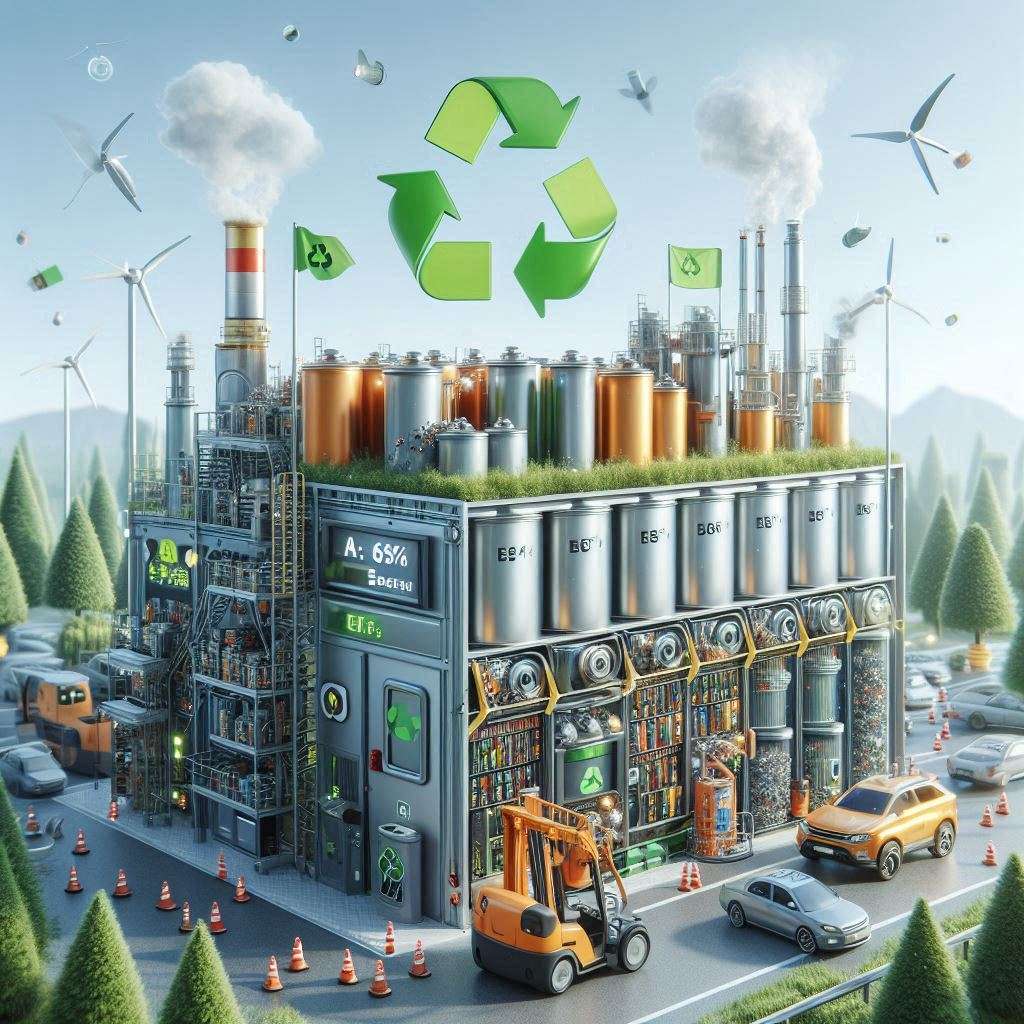Mercedes Benz New EV Battery Recylcing Plant
A few big questions come up whenever someone mentions an EV:
- Where do all the materials some from? Isn’t that environmentally unfriendly?
- What happens to the batteries when you’re finished with them?
- What about waste and inefficiency in manufacturing?
Let’s take a look, because, there’s a transformative shift happening in the world of electric vehicle production right now. The launch of Mercedes-Benz’s groundbreaking battery recycling plant in Kuppenheim, Germany is one such example. So let’s explore how this facility achieves an impressive recovery rate for valuable materials like lithium. The plant sets a new standard for sustainability in the automotive industry. Advanced recycling techniques, allow this plant to not only minimise waste and energy consumption but also pave the way towards a circular economy, ultimately enhancing eco-friendly solutions in electric mobility.
Overview of the Kuppenheim Plant
At the forefront of sustainable innovation, the Kuppenheim plant exemplifies Mercedes-Benz’s commitment to circular economy practices. This advanced facility boasts a remarkable recovery rate of over 96% of valuable materials like Lithium, nickel and cobalt from electric vehicle batteries, further establishing the brand as a leader in eco-friendly automotive solutions.
Location and Size
At about 6,800 square meters, the plant is strategically situated in Kuppenheim, Germany. Its location facilitates efficient logistics and strengthens the integration of sustainable practices within the local automotive ecosystem. Nestled in the heart of Germany’s south eastern car manufacturing region near Stuttgart, Mannheim and Strasbourg, the plant is ideally suited to recycle materials right back into the supply chain.
Production Capacity
By processing an impressive 2,500 tonnes of batteries annually, the Kuppenheim plant is engineered to meet the growing demand for sustainable EV solutions. The recycled materials produced here can construct over 50,000 new battery modules each year, significantly contributing to the reduction of waste in the automotive industry.
Indeed, this substantial production capacity not only supports Mercedes-Benz’s sustainability goals but also enriches the circular economy. Every mineral that can be recycled means less mining for new materials. While mining won’t stop, it does mean less impact on the environment, and better control to prevent slave and child labour.
Recycling Technology
Any modern recycling facility must prioritise innovative technologies to enhance material recovery and sustainability. The newly established battery recycling plant in Kuppenheim, Germany, stands out with its impressive 96% recovery rate of valuable materials like lithium, nickel, and cobalt. By employing state-of-the-art methods, advanced recycling contributes significantly to the circular economy and supports sustainable electric vehicle production.
Mechanical-Hydrometallurgical Process
The mechanical-hydrometallurgical process used in this facility sets a benchmark in battery recycling. This efficient technique enables the separation and refining of critical materials to battery-grade quality, ensuring that you benefit from high-quality recycled resources that can be repurposed effectively in new batteries.
Energy Efficiency Features
Among the many impressive aspects of the Kuppenheim plant are its energy efficiency features. Operating at temperatures up to 80°C, this facility minimises energy consumption and waste, producing recycled materials with a lower environmental footprint. This innovative approach not only contributes to sustainability but also positions the plant as a leader in responsible manufacturing practices.
The facility incorporates a 350-kilowatt photovoltaic system, enhancing its commitment to green energy. By harnessing solar power, the plant aims for net carbon neutrality while efficiently processing 2,500 tonnes of batteries annually. These energy solutions play a vital role in Mercedes-Benz’s broader sustainability strategy, setting a high standard for future innovations in electric mobility and recycling technologies.
Environmental Impact
There’s an increasing awareness of the need for sustainable practices in the automotive industry. Mercedes-Benz’s new battery recycling plant not only achieves the remarkable 96% recovery rate of valuable materials but also emphasises eco-friendly manufacturing processes. By reducing waste and preserving resources, this facility helps minimise the environmental footprint of electric vehicle production, helping contribute to contribute to a greener future.
Carbon Neutrality Initiatives
Behind Mercedes-Benz’s commitment to sustainability lies a robust strategy aimed at achieving carbon neutrality. The Kuppenheim plant, operating with a state-of-the-art photovoltaic system, builds electric mobility while contributing to a net carbon-neutral process. This initiative aligns with Mercedes Benz’s environmental stewardship strategy, showcasing how modern automotive innovations can lead to a sustainable future.
Renewable Energy Integration
Integration of renewable energy sources is central to the operation of the Kuppenheim facility. The site features a 350-kilowatt photovoltaic system, enabling the recycling process to harness solar energy efficiently. By utilising this renewable resource, the facility ensures that your contribution to electric vehicle production is not only innovative but also environmentally responsible.
Environmental benefits extend beyond just emissions reduction; the integration of solar energy promotes sustainable practices within the battery recycling chain. This ensures that energy consumption is minimised while maximizing recovery and recycling efficiency.
Economic Significance
The Kuppenheim battery recycling plant illustrates it’s economic impact. Sustainable practices, indicate a shift in the automotive industry that not only reinforces Germany’s global positioning but also drives innovation in eco-friendly technologies. This facility bolsters the regional economy through its investments and technological advancements, which resonate with broader sustainability goals.
Investment and Job Creation
The establishment of the plant will create numerous jobs, strengthening the community and supporting economic resilience. Skilled and non-skilled employment will include older people, and young people, including traineeships and new opportunities.
Contribution to the Local Economy
The Kuppenheim plant represents a robust investment in both entrepreneurship and workforce development. By processing an impressive 2,500 tonnes of batteries annually, the facility generates high-demand recycled materials, providing local suppliers potential partnership opportunities, and promoting the region’s growth.
This investment creates a ripple effect, as income generated from the recycling plant enhances overall economic activity. As the facility thrives, you can expect local businesses to benefit from increased demand and purchasing power, contributing to a healthier economic environment. This collaboration encourages community engagement and amplifies the importance of sustainable initiatives in modern manufacturing.
A recycling plant is unlikely to operate in isolation. It willl require outside industry to provide tools, systems and expertise, while putting raw materials back into the supply chain for other industries to use.
Collaborative Efforts
To achieve groundbreaking advancements in battery recycling, Mercedes-Benz has engaged in significant collaborative efforts. By partnering with various organisations, including Primobius, the company is harnessing the skills and expertise necessary for innovative recycling solutions, ensuring a brighter and more sustainable future for electric vehicle production.
Partnerships and Joint Ventures
Efforts between Mercedes-Benz and Primobius, a joint venture of SMS Group and Neometals, are instrumental in establishing Europe’s premier battery recycling facility. This partnership not only fuels technological innovation but also boosts local economies while optimizing the recycling process to recover more than 96% of valuable materials.
Involvement of Academic Institutions
Around the world, academic institutions play a vital role in advancing battery recycling technologies. By collaborating with three German universities, Mercedes-Benz is tapping into cutting-edge research to enhance the efficiency, safety, and scalability of their recycling processes. This partnership reflects an ongoing commitment to integrating academic knowledge with practical applications.
Academic institutions contribute valuable insights and research capabilities that drive innovation in battery recycling. Their expertise ensures that the recycling processes deployed at the Kuppenheim facility are not only efficient but also reflect the latest advancements in materials science. By leveraging these collaborations, you can be assured that the recycling methods utilised are at the forefront of technological progress, making people’s investments in electric vehicles more sustainable and environmentally friendly.
Future of Battery Recycling
Industry experts predict that advancements in battery recycling will significantly reshape the landscape of electric vehicle production. As facilities like Mercedes-Benz’s Kuppenheim plant demonstrate, achieving a recovery rate of over 96% for valuable materials such as lithium, nickel, and cobalt not only enhances sustainability but also ensures a steady supply of important components for future EVs. This eco-friendly approach helps reduce reliance on new raw materials and minimises environmental impact, signaling a promising future for sustainable automotive practices.
Role in the Circular Economy
With increasing focus on reducing waste and promoting recycling, battery facilities play a significant role in advancing the circular economy. By adopting a closed-loop system, the Kuppenheim plant not only processes waste materials but also brings them back into the production cycle. This method aligns with global sustainability goals and resource conservation, ultimately leading to a cleaner, greener future.
Sustainable practices encourage the reconditioning of older batteries for second-life applications, such as stationary energy storage. This innovative approach not only maximises resource utilisation but also reduces the need for new raw materials, supporting a circular economy model.
Innovative Battery Recycling Plant up to 96% Efficiency in Eco-Friendly Solutions
It’s easy to see how Mercedes-Benz’s new battery recycling plant showcases an impressive recovery rate of valuable materials from EV batteries. This pioneering facility exemplifies advanced recycling technology and emphasises sustainable practices within the automotive industry. By integrating efficient processes and renewable energy, this initiative not only advances eco-friendly solutions but also drives the circular economy forward, ultimately benefiting both the environment and the future of electric mobility.






